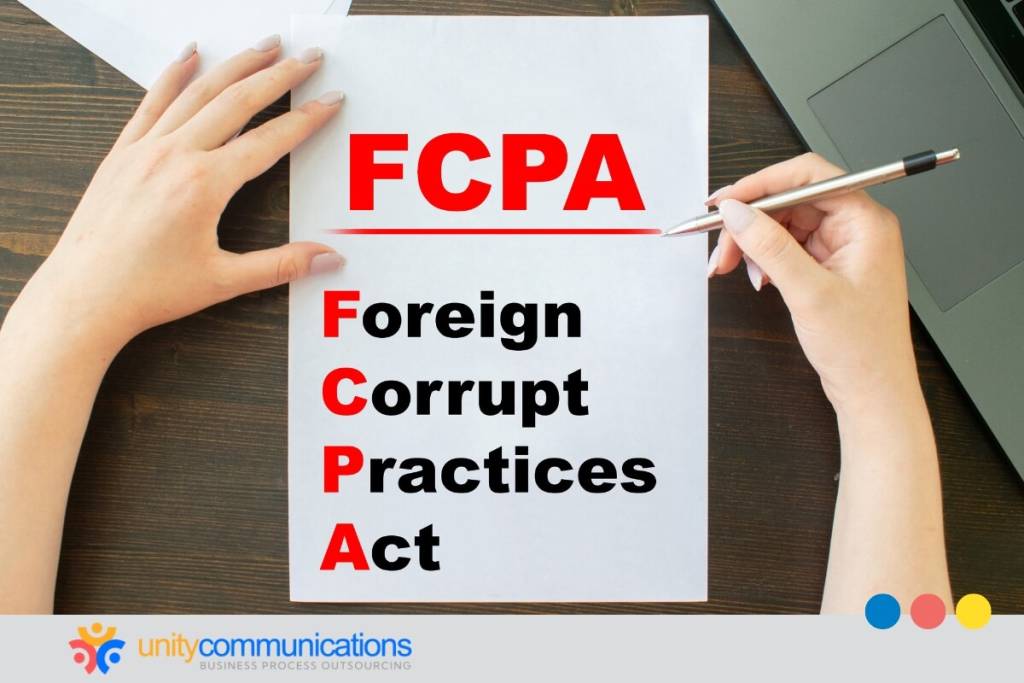Table of Contents
Given the intense global competition, businesses might be tempted to view bribes as an acceptable “cost of doing business.” However, such an attitude can be highly detrimental.
The United States and most European countries have implemented regulatory frameworks that enforce strict criminal and financial penalties on companies involved in corrupt activities.
For those contemplating business process outsourcing (BPO), comprehending how the Foreign Corrupt Practices Act (FCPA) addresses bribery and outlines compliance requirements is imperative.
This article discusses the interconnection of FCPA and outsourcing, the importance of maintaining compliance in BPO, and the strategies to avoid noncompliance.
FCPA Compliance Requirements

The FCPA prohibits U.S. corporations and individuals from providing anything of value to foreign governments or officials in exchange for favorable action, such as business or competitive advantages. The Securities and Exchange Commission (SEC) and the Department of Justice (DOJ) enforce the FCPA.
Enforcement trends indicate the DOJ and SEC are focusing on third-party due diligence. According to Stanford Law School, nearly 90% of FCPA matters involving bribery allegations include the use of third-party intermediaries. To ensure compliance, companies must assess both internal behavior and the actions of third parties in the supply chain.
Companies should proactively evaluate the risks posed by third parties, including BPO providers. They must examine red flags such as excessive consultant commissions, substantial distributor discounts, or close relationships with government officials.
The FCPA implies that companies failing to make such efforts may be deemed “willfully blind” to compliance matters and face charges.
The DOJ and SEC collaboratively issued a guide for implementing effective due diligence programs. They propose three principles for managing third-party and outsourcing relationships concerning the FCPA:
- Companies should know third parties’ qualifications, associations, and reputations concerning foreign officials.
- Companies should verify and document that supplier payments align with the work.
- Companies should continually monitor third parties through periodic audits and requests for annual compliance certifications.
Risks of FCPA Noncompliance
Investigations into FCPA compliance can extend over several months and, upon the public release of findings, lead to significant reputational harm for companies. To mitigate these risks, companies frequently opt to settle with enforcement agencies.
According to Stanford’s research, over 90% of SEC-investigated publicly traded companies choose this route. One example is 3M, a Minnesota-based company. The company has consented to pay over $6.5 million to settle allegations of breaching the books, records, and internal controls provisions outlined in the FCPA.
Workers from a 3M subsidiary based in China organized for Chinese healthcare officials to participate in international conferences, educational events, and visits to healthcare facilities as part of marketing and outreach initiatives. However, these activities were frequently a guise for providing overseas travel, sightseeing, and entertainment.
The potential penalties for FCPA noncompliance are substantial. In 2020, Goldman Sachs Group Inc. faced a $3.3 billion fine for alleged bribery of officials in Malaysia and Abu Dhabi, marking the largest fine ever and surpassing Airbus SE’s multibillion-dollar fine earlier that year.
Noncompliance may also lead to the following:
- Individuals may face anti-bribery fines of up to $100,000, and companies may be subject to penalties of up to $2 million.
- Individuals could be fined up to $5 million for accounting and record-keeping penalties, while companies may face penalties of up to $25 million.
- Individuals may be sentenced to five to 20 years in prison.
Additional penalties encompass SEC-imposed fines of up to $10,000 per violation, along with various consequences such as:
- Asset forfeiture
- Injunctions
- Revocation of import/export privileges
- Inability to engage in government business
- Loss of investor funding
The situation can worsen once the information becomes public, as disgruntled shareholders are not hesitant to pursue legal action.
Since 1977, companies have paid billions of dollars to settle FCPA violations. Adhering to ethical business practices and conducting due diligence when entering outsourcing relationships are essential to prevent noncompliance.
Important FCPA and Anti-bribery Compliance in Outsourcing

The FCPA is a critical piece of legislation in the United States that aims to combat bribery and corruption, both domestically and internationally. FCPA enforcement and anti-corruption compliance are critical in the context of outsourcing for several reasons:
- Legal consequences. Noncompliance with the FCPA can result in severe legal consequences, including fines and penalties. If a company engages in corrupt practices through its outsourcing activities, it can face prosecution, leading to financial losses and reputational damage.
- Reputation management. FCPA compliance is closely tied to a company’s reputation. Engaging in corrupt practices can tarnish a company’s image and erode the trust of stakeholders, investors, customers, and the public. Maintaining FCPA compliance in outsourcing helps demonstrate a commitment to ethical business practices.
- Risk mitigation. Outsourcing often involves dealing with third-party vendors and agents, especially in international business relationships. FCPA compliance helps mitigate the risk of engaging with partners who may be involved in corrupt practices. Thoroughly assessing BPO partners can help identify and avoid firms with a history of corruption.
- Competitive advantage. Companies integrating FCPA compliance programs into their outsourcing activities may gain a competitive advantage. Ethical business practices can be a distinguishing factor in the marketplace, attracting customers and partners who value integrity and transparency.
- Global reach. The FCPA’s reach extends beyond U.S. borders. Companies, regardless of their location, may be subject to the FCPA if they conduct business in the U.S. or are listed on U.S. stock exchanges. BPO activities involving U.S. firms or transactions may fall under its jurisdiction.
- Corporate governance and accountability. FCPA compliance is an integral part of good corporate governance. Companies are expected to implement robust internal controls and ethical provisions. Failure to comply can lead to questions about the effectiveness of the company’s governance and accountability structures.
- Due diligence. FCPA compliance necessitates thorough due diligence when selecting BPO partners. This process includes assessing potential vendors’ integrity and business practices to ensure they align with ethical standards. Enhanced due diligence helps identify and address any red flags before entering into business relationships.
FCPA Compliance: Responsibilities of the Outsourcing Client
Under the FCPA, the client firm oversees the outsourced components, a duty that may exceed the monitoring applied to other vendors. These components must align with the FCPA’s compliance program structure and the outsourcing client’s overall culture.
The U.S. Federal Financial Institutions Examination Council (FFIEC) establishes consistent principles, standards, and report forms for examining vendor compliance in financial institutions regulated by federal authorities. Here are the due diligence recommendations it provides for firms engaged in outsourcing activities:
- Appoint the appropriate executive and department to oversee the relationship and ensure BPO vendors adhere to contracted procedures, encompassing recordkeeping, status report delivery, and data privacy.
- When outsourcing functions, the internal team should manage the relationship while keeping affected teams, such as audit, human resources (HR), and information technology (IT), informed and prepared to make necessary program adjustments.
- The in-house team is responsible for assessing vendor risks. This should involve reviewing the vendor’s staff expertise, licenses, registrations, professional references, supervisory structure, procedures, financial stability, and insurance. Research, interviews, and client reviews can be used to conduct these assessments.
- Continuous monitoring of the above factors is crucial, especially when the BPO provider delivers compliance-related services. Any proposed personnel changes by the BPO provider must be communicated to the client for a review of the candidate’s background and credentials.
- BPO clients should steer clear of conflicts of interest in their outsourcing relationships. The in-house team must remain vigilant for any signs of conflicts involving relationships maintained by the BPO firm, its employees, subsidiaries, or third parties employed by the BPO.
- Thorough documentation of conflict reviews is essential. Note other clients the BPO provider serves and its employers, officers, and directors.
- The vendor’s financial stability is a prerequisite. The in-house department should conduct a credit review, considering any liens, judgments, or other financial challenges and documenting these considerations.
- The vendor must guarantee the strict confidentiality of the client’s records and demonstrate processes and controls for secure data storage. Providing specialized training to the vendor on maintaining data confidentiality and restricting access is advisable.
- The outsourcing contract should stipulate the client’s right to receive detailed progress reports and confirmations of completed work stages. It should also outline the client’s entitlement to periodic audits of the provider’s work and business.
- The contract should incorporate the BPO company’s agreement to allow the client to review any third parties it employs and the BPO company’s business continuity plan, particularly considering changes during the contract period.
FCPA Compliance: Strategies BPO Firms Utilize

In contrast, what is the BPO firm’s role in ensuring compliance? Ensuring FCPA and anti-corruption compliance is crucial for outsourcing firms, especially given the international nature of their operations. Here are vital steps that BPO organizations take to promote and maintain FCPA compliance and anti-bribery provisions:
- Risk assessments. BPO firms regularly assess and identify the potential FCPA risks associated with their operations, including interactions with foreign officials and third-party vendors. They consider the geographic locations where services are provided and the corruption risk in those regions.
- Policies and procedures. Outsourcing providers develop and enforce comprehensive anti-corruption policies and procedures that explicitly address FCPA compliance. They ensure that all employees, including management, are aware of and trained in these policies.
- Research and evaluation. Reliable service providers perform thorough due diligence on agents and intermediaries before entering into business relationships with clients. They include anti-corruption clauses in contracts and agreements and clarify that compliance with the FCPA is a nonnegotiable requirement.
- Training and awareness. A trusted partner provides regular training programs to educate its employees about the FCPA, anti-corruption policies, and the importance of compliance. Outsourcing providers also include specific training for employees involved in international business transactions and those interacting with government officials.
- Monitoring and auditing. Reputable vendors establish a monitoring system to regularly review and audit financial transactions, especially those involving interactions with foreign officials. They implement internal controls and conduct periodic audits to enforce policies and procedures effectively.
- Whistleblower mechanisms. Outsourcing providers implement confidential reporting mechanisms or whistleblower programs to encourage employees to report potential FCPA violations without fear of retaliation. They ensure clear procedures for investigating and addressing reported concerns.
- Compliance oversight. BPO firms appoint a dedicated compliance officer or team to oversee and enforce FCPA compliance. They ensure a direct reporting line to the senior management or board of directors to highlight the importance of compliance.
- Transaction documentation. Reliable service providers maintain accurate and detailed records of all transactions, particularly those involving government officials or agencies. Proper documentation can serve as evidence of transparent and legitimate business practices.
- Continuous improvement. Outsourcing providers regularly review and update anti-corruption policies and procedures to adapt to changes in the business environment or regulatory landscape. They stay informed about developments in FCPA regulations and adjust compliance programs accordingly.
- Legal consultation. A trusted partner seeks legal advice from experts familiar with FCPA regulations to ensure policies and procedures align with current legal requirements. They consult legal counsel when entering new markets or engaging in activities that may pose increased compliance risks.
The Bottom Line
FCPA and anti-corruption compliance are crucial in outsourcing to mitigate legal risks, safeguard brand reputation, gain a competitive edge, and demonstrate a commitment to ethical business practices on a global scale.
Companies should integrate FCPA enforcement actions into their outsourcing strategies and diligently screen potential partners to ensure compliance throughout their supply chain.
A transparent and knowledgeable BPO partner such as Unity Communications can help mitigate the risk of FCPA violations and maximize profits. Let’s connect to learn how FCPA and other laws affect outsourcing!




